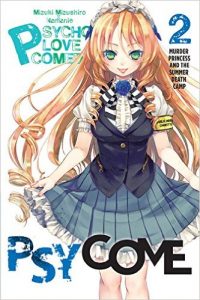By Mizuki Mizushiro and Namanie. Released in Japan by Enterbrain. Released in North America by Yen On. Translated by Nicole Wilder.
The second volume of Psycome takes its premise and runs with it, as we see our class of murderers sent on a field trip/survival camp, a trope that I thought was actually more Western than anything else but apparently must pop up in Japan as well. Once at camp, we get the usual combination of cliched romantic comedy antics and attempted killings, even though, of course, murder is absolutely prohibited by the staff. We see such cliches as walking across a rickety rope bridge, class skits around the campfire, late-night ero comedy at the hot springs, and a nature walk to boot. And all this is supervised by a new girl, Shamaya, the Murder Princess of the title. And unlike Kyousuke or Eiri, she is definitely here for genuine murder, as she sees fit to gleefully tell us.
Just as all the main cast are painful cliches, so is Shamaya – as you can tell from the cover art, she’s the pampered ojou-sama type, and also fills in as head of the Public Morals Committee, dedicated to making sure all the new freshman are following the straight and true path. Of course, after Book One we know that said path is turning teenage killers into professional assassins, so we’re not too impressed. And indeed Shamaya is fairly easily thrown off her game – at first by people merely breaking the rules (such as the three goons whose names I can’t even remember trying to strangle Kyousuke), but later on she meets her match in Maina, the baby-talking clumsy girl who’s in this school for accidental deaths so ludicrous that no one believes they’re accidental. Maina brings out Shamaya’s true psychotic nature, but unfortunately for her there’s already a better psycho in town, Renko.
The book continues to walk a fine line, and doesn’t always succeed – sometimes when it tries too hard to be earnest or serious, I don’t feel as if it’s earned it. Hence I was skeptical of Shamaya’s heel-face turn after Maina’s big speech, and kept waiting for it to be another trick. Some of the comedy also falls flat, such as the epilogue where Shamaya seems to have traded in her murderous impulses for yuri impulses. But this is offset by some genuinely good set pieces, such as Eiri’s apology to Kyousuke for being such a tsundere to him, which *does* seem genuine and earned, or Maina’s aforementioned speech, which is depressing but also uplifting. And some of the comedy managed to surprise me and make me laugh, particularly Renko’s beatboxing rap group, which has to be read to be believed.
So, as with the first volume, we’re left with a promising yet deeply inconsistent book with an intriguing premise. The epilogue promises us a new character in the third volume, which I suspect will ramp up another cliched harem comedy trope accordingly, much as I’d wish it wouldn’t. But that’s what you get when you read a series like this. If they’re going to set a series in a wacky prison school and then throw in every cliche in the book, it would feel wrong not to hit every cliche. I’m not sure I could tolerate a manga or anime of this, but as prose, Psycome is amusing, goofy fun.


Speak Your Mind